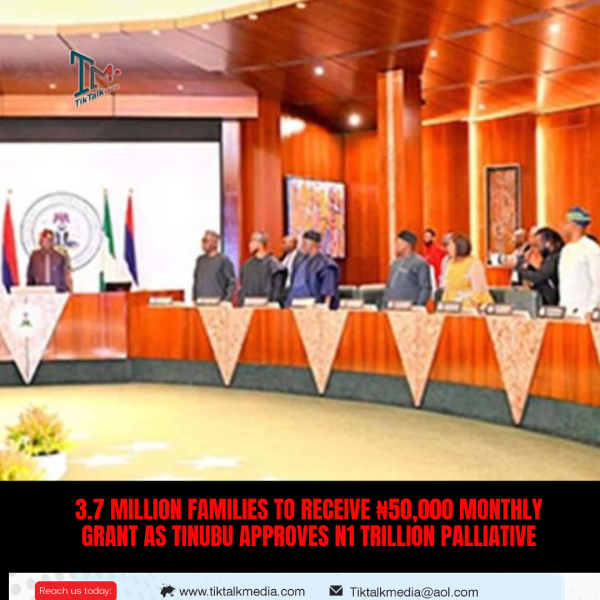President Bola Tinubu has announced a National Construction and Household Support Programme, which will provide 100,000 families in each state with a ₦50,000 monthly grant for three months. Additionally, ₦155 billion will be allocated for assorted foods, and ₦540 billion for household grants.
Tinubu unveiled these directives at the 142nd National Economic Council (NEC) meeting, which included state governors and deputies at the State House, Abuja. The ₦50,000 monthly grant targets 3.7 million families across the 36 states and the Federal Capital Territory (FCT). The plan also includes a ₦10 billion allocation for CNG buses in the 36 states and the FCT, with the assorted foods costing over ₦1 trillion.
Tinubu issued a seven-day ultimatum for all state governors to provide detailed feedback on their plans to enhance food production in their respective states. He emphasized the importance of collaboration to meet citizens’ needs and expressed his readiness to support these efforts to alleviate economic hardships. Tinubu stated, “We must deliver on our targets at all levels. Please report back following your consultations and submit it to my office within seven days. How much support do you need from me and in what form? I am prepared to provide it. But we must achieve the result. There is nothing we are doing that is more important than producing high-quality food for our people to consume, buy, and sell. We create jobs in the production of it. And that is before we generate wealth by exporting the excess. It is not beyond us to achieve this for Nigerians.”
The President’s directive comes amid multiple economic challenges, including high inflation driven by the removal of fuel subsidies and exchange rate depreciation, which reached 27 percent year-on-year in October 2023. These factors, combined with high food insecurity, have exacerbated the cost-of-living crisis, making it difficult for many Nigerians to afford basic necessities.
Despite significant policy reforms such as the removal of fuel subsidies and the unification of exchange rates, Nigeria continues to face challenges of poverty, stalled per-capita growth, and a weak business environment. These issues are further compounded by external pressures such as global food price surges and geopolitical uncertainties.
At the NEC meeting, Tinubu also announced new plans to boost agricultural productivity and strengthen the economy by creating opportunities in agriculture, manufacturing, and construction. The immediate rollout of the National Construction and Household Support Programme will cover all geopolitical zones in the country.
The programme prioritizes significant infrastructure projects, including the Sokoto-Badagry Highway, which will traverse Sokoto, Kebbi, Niger, Kwara, Oyo, Ogun, and Lagos. The Lagos-Calabar Coastal Highway and the Trans-Saharan Highway, linking Enugu, Abakaliki, Ogoja, Benue, Kogi, Nasarawa, and Abuja, are also included. Additionally, Tinubu approved full counterpart financing for the Port Harcourt-Maiduguri Railway and the Ibadan-Abuja segment of the Lagos-Kano Standard-Gauge Railway.
Special Adviser on Media and Publicity, Mr. Ajuri Ngelale, revealed that the Sokoto-Badagry road project is especially prioritized due to its importance, as it traverses states critical to the nation’s agricultural sustainability. The corridor includes 216 agricultural communities, 58 large and medium dams, seven Special Agro-Industrial Processing Zones, 156 local government areas, 39 commercial cities and towns, and over 1 million hectares of arable land.
Other elements of the National Construction and Household Support Programme include a one-off allocation of ₦10 billion to each state and the FCT for the procurement of buses and the CNG uplift programme, a ₦50,000 uplift grant to 100,000 families per state for three months, and the deployment of ₦155 billion for the purchase and distribution of assorted foodstuffs nationwide.
President Tinubu attended the NEC meeting, typically chaired by Vice President Kashim Shettima, for the first time. The NEC was expected to deliberate on the new minimum wage following Tinubu’s decision to delay the National Minimum Wage Committee’s proposal for further consultations with stakeholders, including state governors.
Minister of Agriculture and Food Security, Abubakar Kyari, highlighted plans to acquire 2,000 tractors annually for the next five years, with 600,000 youths managing 1,000 service centers. The arrangement includes partnerships with John Deere, Tata, and Belarus Tractors to provide the tractors, implements, and spare parts. Additionally, Saudi Arabia has expressed interest in purchasing 200,000 metric tons of red meat and 1 million tons of soybeans from Nigeria annually.
Governor Hope Uzodimma of Imo State noted that the NEC has directed the sub-committee on crude oil theft to provide comprehensive recommendations to address the issue in the next meeting




